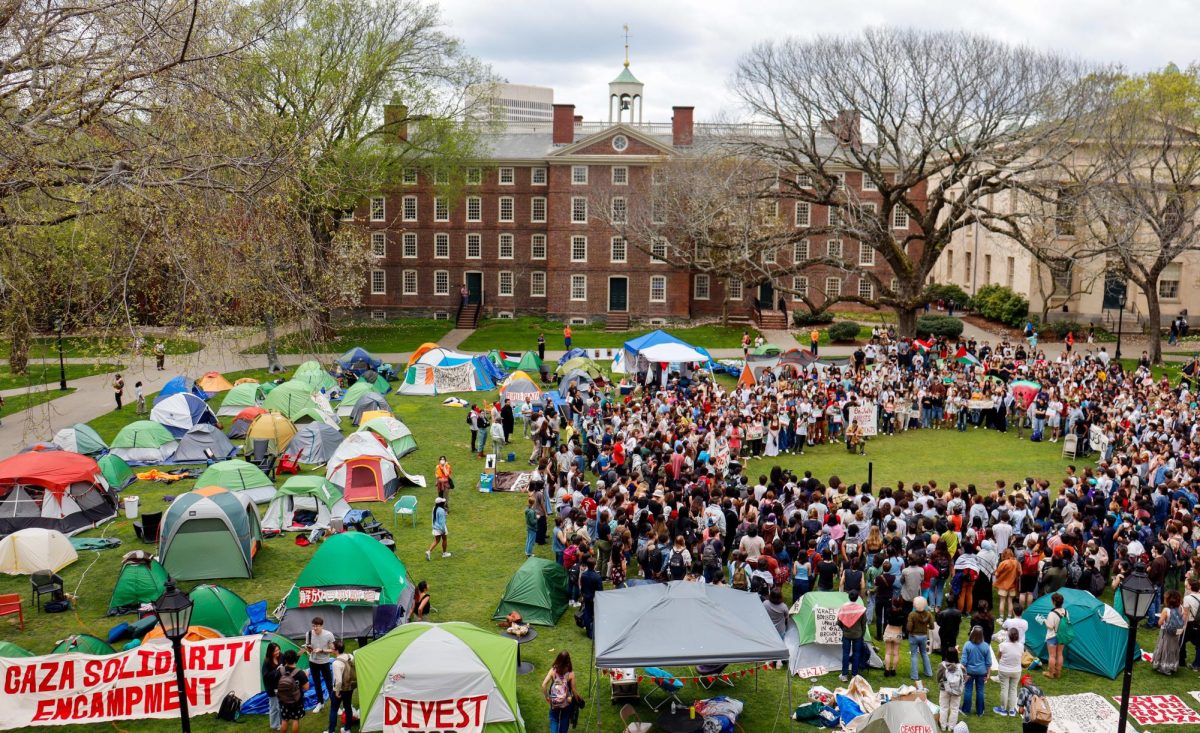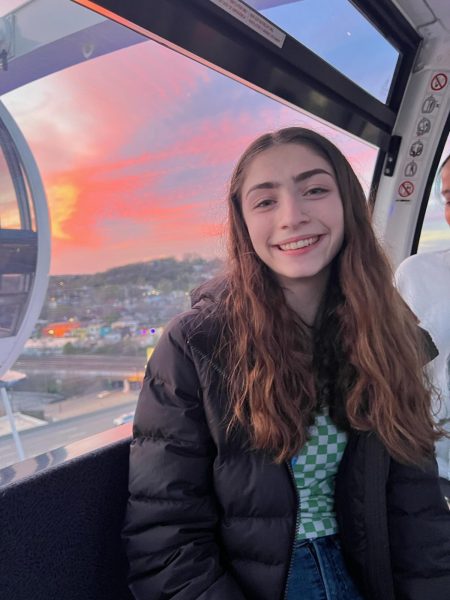For the class of 2023, freshman year of college has taken an unexpected turn.
“It’s dystopian, absolutely crazy,” Sasha Nelson ’23 says in a Zoom interview from her dorm room at UCLA, where she studies economics.
Nelson is referring to the recent protests at UCLA, where a violent brawl broke out after counter protesters largely unaffiliated with the university attacked an encampment protesting the war in Gaza. Similar encampments, inspired by protests at Columbia University, have sprung up on college campuses across the United States, with students calling for their universities to disclose their investments and divest from companies associated with Israel. The demonstrations have prompted schools to cancel classes, hold lessons online, and even call off graduation ceremonies.
While at some schools, like Brown University, encampments ended peacefully after administrators agreed to explore divestment, at others, university leaders generated controversy by calling in the police. “The New York Times” reports that more than 2,900 people have been arrested or detained on college campuses since April 18. “Tatler” spoke to two college students with differing perspectives on the protests.
Nelson, who is Jewish, says that, while the encampment was active, she felt “incredibly unsafe,” in part due to the non-students who joined the protests. Around her neck, she wears a Star of David necklace and a dog tag inscribed with Hebrew and English lettering that calls for the return of the hostages taken by Hamas, the terrorist group governing Gaza, on October 7th, but sometimes questions whether she should tuck them in. Nelson says she no longer walks around with two AirPods in so she can stay aware of her surroundings.
“I’ve really never had to do [this] before. I’ve definitely experienced more antisemitism in the past seven months than I have in my life,” she says.
This fall, as she was walking back from class, she saw two masked people, tearing down posters that called for the release of the hostages. Each poster contained the name and picture of a hostage, and Nelson says the people were using a “large knife” to remove them.
“I try to take a photo of them because you can’t brandish a knife on campus,” she says. “And then they turn around, they see me and they start screaming at me and they start coming towards me with this knife.”
Nelson says that, although she was in a populated area, no one came to help her. She reported the incident to the police, but it was difficult to provide information because the people kept their faces covered, and ultimately no one was charged.
Since November, Nelson has participated in two pro-Israel rallies, including a recent counterprotest that took place next to the encampment (though she was not present during the attack). She was also part of a group of Jewish students who met with UC regents on April 22, just before the UCLA encampment was set up.
For Nelson, the conflict is deeply personal. She is the descendant of Holocaust survivors, and several of her family members live in Israel, including a cousin who lives in Tel Aviv with his wife and two children. “When someone at UCLA writes [on] the ground ‘We want to burn Tel Aviv,’ I’m like, ‘Well, that’s where my family is. That is where my cousins are. You want to burn that.’”
But Nelson’s perspective is by no means representative of all Jewish students.
At Brown University, Talia LeVine, a Jewish student who graduated from Seattle’s University Prep (UPrep) in 2023, has been heavily involved in the protests. She is a founding member of BrownU Jews for Ceasefire Now (JFCN), an organization that helped run the encampment, where she works on social media and photography. LeVine is currently on probation for her involvement in the encampment.
“Fighting for Palestinian liberation for me is at the very core of my Judaism,” LeVine says. While at UPrep, she served on the Holocaust Center for Humanity’s Student Leadership Board for four years. “You learn to advocate for Holocaust education in schools, and then you see genocide happening before you, and I personally feel like it is my job to do everything in my power to fight against it.”
Today, LeVine is confident that she and the other student protestors are on the “right side of history.” But she hasn’t always been certain. Her current activism stands in sharp contrast to her upbringing — she went to Hebrew immersion preschool, took a family trip to Israel as a toddler, and grew up attending synagogue. She was taught a history of Israel she no longer believes.“There’s been a lot of [people] coming after me…saying that I’m just ‘brainwashed’ and ‘believe propaganda,’ but I view it more as I have unlearned a lot of the brainwashing and propaganda that I grew up with.”
LeVine says that she first began to question what she had been taught growing up when, in junior year, she spent a semester abroad at the School for Ethics and Global Leadership (SEGL) in Johannesburg, South Africa. There, she says, she learned about and witnessed firsthand the effects of apartheid.
“I talked to a lot of people and I was like, ‘You know what? What I was raised to believe is just not true.’ … And so once I took the time to unlearn and re-educate myself, it became really clear to me what I believe in,” she says. “What I believe in is Palestinian liberation and fighting against genocide.”
Since she arrived at Brown, LeVine, who is studying political science and visual arts, says she has made an effort to learn more about the Israeli-Palestinian conflict and talk to Palestinian people, whom she says she was “raised to fear.” She counters those who argue that the college protestors lack historical understanding: “I’ve spent the past four months studying this [conflict] with one of the world’s leading genocide scholars, and so I think I do have a pretty nuanced understanding of this history,” she says. “There is a clear right and wrong here. And I think that I am right.”
LeVine maintains that the encampment at Brown was not antisemitic, even though it could have made students “who happen to be Jewish and also Zionist feel uncomfortable.” She says that the protest was calling out students for their support of Israel, not their religion.
“I just feel so strongly that protesting for Palestinian liberation…is not in any way, shape or form antisemitic. It is instead the most authentic way of expressing your Judaism and adhering to Jewish values,” she says, citing the Jewish value of tikkun olam, or trying to repair the world. “I’ve never felt more loved and appreciated as a Jewish person than when I am in pro-Palestinian communities.”
LeVine says that when, in the Brown encampment, Jewish students hosted a Passover Seder and Shabbat services, many non-Jewish students were eager to learn about the traditions.
Though she acknowledges the existence of antisemitism and says that, from a young age, she, herself, has experienced “microaggressions,” she feels that “there is a very, very small group of people who are antisemitic [and] the media is really taking that and using it to cover up all of the other fighting for Palestinian liberation that people are doing that is not antisemitic.”
Although their views on the conflict differ, Nelson and LeVine have one thing in common: their outspokenness has taken a toll on their personal relationships. Nelson estimates that she has been unfollowed or blocked on social media by 20 people — including several of her Lakeside classmates.
“…I have shown public support for Israel’s right to defend itself against the terrorist organization Hamas,” she says. “And that is enough for friends that I’ve had through middle school or high school to say ‘I’m done.’ To write something mean to me on Instagram, tell me I’m a genocide supporter, that I like killing babies, and then cut me off.”
She recalls being kicked out of a study group after someone saw her pro-Israel Instagram post. Nelson says that, before blocking her and removing her from the group, her UCLA classmate told her “Don’t be friends with me if you’re posting propaganda. I don’t want to know someone who supports genocide.”
As for LeVine, though her immediate family has supported her activism, some members of her extended family have cut her off, and she’s received negative responses on social media from former UPrep friends.
“I have some extended family that I’m not as close to…who now are convinced that I’ve been radicalized and who think I’m crazy, and who want nothing to do with me,” she says. “And I, frankly, want really nothing to do with them, just because I don’t want to be connected to people who I know are on the wrong side of history.”
At the same time, both Nelson and LeVine noted that, for all the friendships they have lost, they have formed new connections, whether it be for Nelson in a chapter of Hillel, a Jewish organization on college campuses nationwide, or for LeVine in pro-Palestinian organizations.
Now, as the school year comes to a close, Nelson and LeVine look toward the future.
LeVine says that, this summer, members of Jews for Ceasefire Now will be preparing for October, when Brown’s governing body will vote on divestment, a meeting the school agreed to in exchange for students dismantling the encampment. She will also be working at a Jewish community center in the Seattle area.
As for Nelson, she is hopeful that schools will be better prepared to handle any protests that arise next fall. “I don’t expect things to shake out the same way next year. I’m optimistic on that.”


